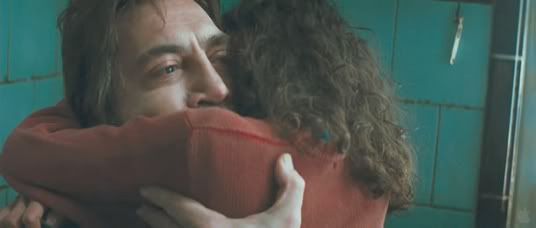
Biutiful feels like the film director Alejandro González Iñárritu has been trying to make all along.
It's downbeat to the point of sending some film critics running for their medicine cabinets. It features carefully choreographed scenes in which the camera weaves amidst and above the Barcelona crowds. It's conscious of the intricate ways various cultures interact in our globalized economy. And it deals in the currency of intention and inadvertent consequence.
The film is Iñárritu's first without screenwriter Guillermo Arriaga, as well as his first without a rigid, time-warping narrative structure. It's also his first masterpiece.
Uxbal (Javier Bardem) eeks out a living as a middle-man between illegal immigrants and nominally legitimate businessmen, putting Chinese to work on construction sites and overseeing a team Senegalese street vendors. On the side, he moonlights as a psychic for families of the recently deceased. His estranged wife Marambra (Maricel Álvarez) cycles in and out of his life, making promises to their two children, Ana and Mateo, that she lacks the ability or willpower to keep. She makes her problems — untreated bipolar disorder and alcoholism — Uxbal's.
And then Uxbal learns the groin pains he's ignored for months are the final signal flares of prostate cancer. As he worked to raise Ana and Mateo on his own and keep his various schemes running, the disease metastasized to his bones and liver. He has mere months to get his affairs in order.
Because it's Iñárritu, there are myriad subplots weaving their way through the film. Unlike his previous attempts, however, these threads all become relevant parts of the whole. They also ratchet up the tension for Uxbal, who valiantly fights through it. He has to reconcile himself to the same premature death that met his father. But mostly, he's scared for his children.
It would've been easy for Iñárritu to martyr Uxbal. He's done it to other characters in his films. Here, we watch as Uxbal does thoughtless and sometimes despicable things out of desperation and frustration. And Bardem goes at it full steam ahead, his face a perfect conduit for the anguish and fear and a million other emotions of a dying man. He does a fantastic job bringing the cause-and-effect nature of the script to life — Uxbal feels X, therefore he does Y — without it seeming robotic or simplistic. Álvarez, too, never fumbles with her tricky character. Marambra understands why her family's drawn away from her and she doesn't. She holds on for dear life.
Finally, Biutiful is a very human film. In his previous outings, particularly 21 Grams and Babel, Iñárritu's characters felt like rag dolls blown by the winds of cruel fate. The tragedies of Biutiful aren't the point of or reason for the film. They are simple facts of life. They instigate change. They force characters to grapple with their past and their future. The film earns its emotional pay-off the old fashioned way and the audience feels (or should feel) the full weight of what's transpired.
There are no BIG scenes in Biutiful, just a lot of little ones that metastasize in your brain through the film's 148 minutes. It left me devastated in a way no other film in recent memory has. Granted, I have a very personal connection to the the material, but it's possibly the most realistically affecting treatment of death committed to celluloid.

No comments:
Post a Comment